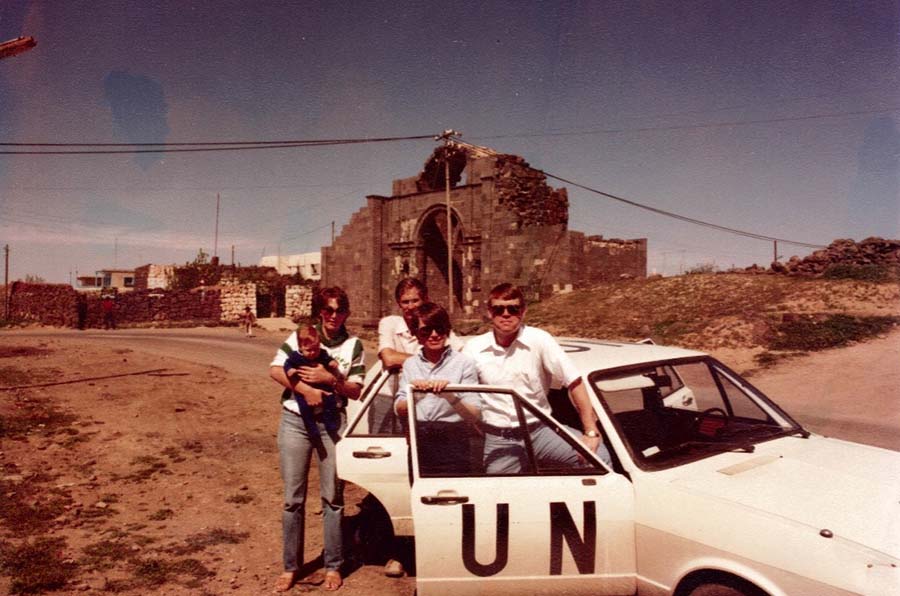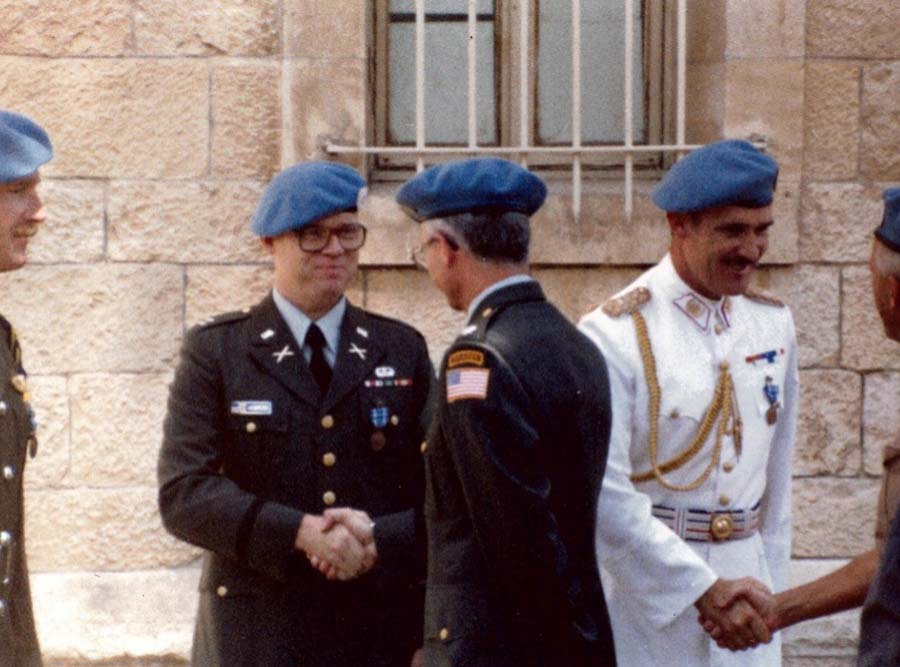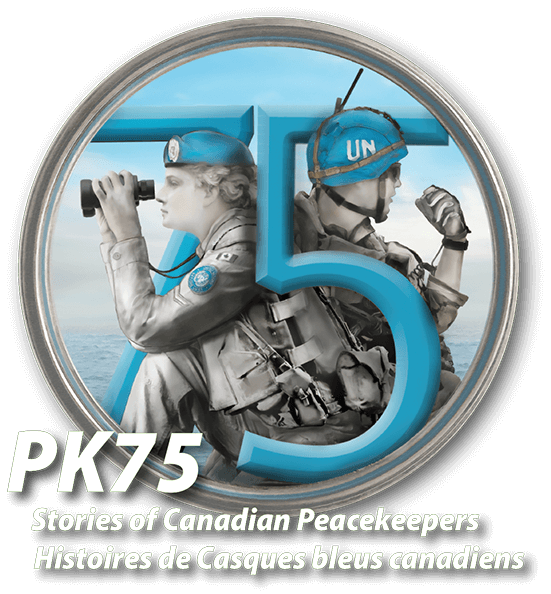

Richmond, VA, United States
Scott Lingamfelter
Current Location: Woodbridge, VA, United States
In 1978, the U.S. Army selected me to be a foreign area officer in addition to my primary duty as an artilleryman. The following year, the Army dispatched me to the University of Virginia to obtain a graduate degree in Comparative Governments of the Middle East and Soviet Foreign Policy. I specialized in U.S.-Iranian relations and was programmed to be part of the military attaché office in the U.S. Embassy in Tehran as my “utilization tour.” However, when the Iranian revolution erupted and the American Embassy was overrun, the Army revoked my assignment to Iran and, in 1981, sent me to the United Nations Truce Supervision Organization headquartered in Jerusalem. When people would ask why the Army picked UNTSO for my utilization experience, I would jokingly say “Well, Israel was the next country on their alphabetical list after Iran.” In truth, my assignment to UNTSO was most relevant to my academic studies.
My first assignment in UNTSO was with Observer Group Golan-Damascus in the Syrian capital that supported the United Nations Disengagement Observer Force (UNDOF) in the Golan Heights. Inside OGG-D, I was sub-assigned to Observer Detachment Damascus (ODD). Indeed, it was “odd.” There I would be one of two U.S. officers working side-by-side with 18 Russians. Nowhere on the globe would you find U.S. and Russian officers working in such proximity during the Cold War. Yet I would find it a fascinating learning laboratory and gained much insight into how Russian officers thought and acted on a very personal basis. I make this observation in my new book, Yanks in Blue Berets: American UN Peacekeepers in the Middle East.
“I knew the U.S.-Russian relationship would be watched closely by many people in and outside of the UN irrespective of the seemingly minor practical role both countries played in keeping peace in the Golan Heights. In reality, our contribution was more strategic than operational.”
Yet it affirmed the legitimacy of UNDOF to have the superpowers configured as we were in Damascus. When I was reassigned to Observer Group Jerusalem (OGJ) four months later, I would reflect on my time with the Russians in Damascus.
In the final analysis, while I would have no frontline peacekeeping duties in Damascus, my relationship with the Russians turned out to be beneficial. It demonstrated that avowed adversaries could engage amicably.
However, in OGJ, not only would I work in UNTSO’s Operation Center, but also perform observer duty in southern Lebanon as part of Observer Group Lebanon (OGL) supporting the United Nations Interim Force in Lebanon (UNIFIL). Duty in southern Lebanon, as I say in my book, was like serving in the “the Wild West without a good saloon.” That became quite evident on my first tour at OP Khiam in mid-June 1981. Australian LTC Pat Marshall-Cormack, who was a fellow artilleryman, Canadian infantryman CPT Jean Lefebvre, and our designated team leader, MAJ Edwardo Laciar, an Argentine Army signal corps officer and I took up duties that were quite eye-opening.
On our first day, Lefebvre and I were dispatched to evaluate what could be observed from UNIFIL positions in our area. Their observations had been suspect, and we were to validate what could reliably be observed from those positions. In the process of climbing and cresting a steep hill in our UN vehicle, Jean and I ran headlong into—inches from our windshield—the barrel of a tank manned by the hostile militia forces of Major Saad Haddad. The Canadian whipped our vehicle into reverse and we cascaded down the hill, only to be held hostage at the bottom for a short while until Jean and I convinced the 16-year-old gunslinger hijacking us that the U.S. and Canada were “really big countries” and hurting us would be a “really bad idea.” He eventually agreed. It was a memorable first experience for both of us and included three flat tires that happened while we inspected UNIFIL positions. Jean would reflect on the tire changing at dinner that night: “We changed the tire without dispute—an amazing thing when you consider that we were two officers! Yes, we had no argument. I sat back and Scott changed the tire!”
My UNTSO experience was a significant career highlight.
Biography
L. Scott Lingamfelter was raised in Richmond, Virginia, where he attended public and parochial schools. He then attended the Virginia Military Institute (VMI) in Lexington, VA, where he earned a B.A. in History in 1973. After graduating from VMI as a Distinguished Military Graduate (DMG), he was commissioned in the Regular Army of the United States and began a career as a Field Artilleryman and a Middle East Foreign Area Officer (FAO).
In 1979, the U.S. Army awarded him a full academic scholarship to the University of Virginia (UVa), where, in 1981, he earned a Master of Arts in Government and Foreign Affairs (Comparative Governments of the Middle East and Soviet Foreign Policy). After many assignments around the world, including Germany, South Korea, and the Middle East (Egypt, Israel, Iraq, Jordan, Kuwait, Lebanon, Saudi Arabia, and Syria), he rose to the rank of Colonel.
Following his service in numerous combat units, the Defense Intelligence Agency (DIA), as a Political Military Officer in the Arms Control and Disarmament Agency (Department of State), and as a senior advisor on Special Access Programs (SAP) to the Secretary of the Army, the Chief of Staff of the Army, and the Vice Chief of Staff of the Army, he concluded his military career as Military Assistant to the Director, Operational Test and Evaluation of the Office of the Secretary of Defense. He is a graduate of the U.S. Army Command and General Staff College, the U.S. Joint Forces Staff College, and the U.S. Army War College where he served as class president. He retired in 2001 after 28 years of active-duty service.
In particular, Colonel Lingamfelter has had significant
experience in the war-torn Middle East as a U.S. Army Military Observer with the United Nations Truce Supervision Organization, working with both Observer Group Syria and Observer Group Lebanon in the midst of armed turmoil. He has witnessed the Middle East conflict “up close and personally,” not only as a military observer, but as a combat artilleryman with the 1st Infantry Division during Operation Desert Storm. In that war, he served as the executive officer in the Division Artillery and helped plan and execute the largest field artillery assault on enemy forces since World War II.
He then was selected to command the Army’s largest field artillery Multiple Launch Rocket System (MLRS) battalion, the 6th Battalion, 37th Field Artillery, in the 2nd Infantry Division in South Korea. During the 1993–1994 crisis with North Korea, Colonel Lingamfelter was one of the architects of the complex and detailed system that the U.S. would use to defeat North Korean artillery systems threatening South Korea. He has a detailed understanding of how this will unfold if hostilities erupt on the Korean peninsula.
Among his numerous awards and decorations are the Defense Superior Service Medal; two Legions of Merit; the Bronze Star Medal; two Defense Meritorious Service Medals; four Meritorious Service Medals; two Joint Service Commendation Medals; the Army Commendation Medal; the National Defense Service Medal with service star; the Southwest Asia Service Medal with three battle stars; the Army Service Ribbon, the Army Overseas Service Ribbon, the Kuwait Liberation Medal; the Saudi-Kuwaiti Liberation Medal; and the United Nations Service Medal.
After retiring from the military, he worked for the private sector focusing on strategic planning in support of the senior leadership for the U.S. Missile Defense Agency in Washington, D.C. Additionally, he has worked in the emergency management, homeland security, and border security arena in support of Federal agencies, states, and localities.
Elected to the Virginia House of Delegates from 2002 to 2018 representing Prince William and Fauquier Counties, then Delegate Lingamfelter was an adherent to the Founders’ vision of constitutional and limited government. He was a prominent voice for both fiscal and social conservatism in the General Assembly.
Since retiring from the General Assembly, he authored his first book, Desert Redleg: Artillery Warfare in the First Gulf War (University Press of Kentucky, 2020) and a second book Yanks in Blue Berets: American UN Peacekeepers in the Middle East that will be released on 4 July 2023 (University Press of Kentucky). He has started another book on reviving the revolutionary spirit of America’s founding fathers in today’s culture. Colonel Lingamfelter routinely contributes to the commentary page of The Washington Times on a range of political and national security topics.
Colonel Lingamfelter and the former Shelley Glick of Bridgewater, VA have been married for the past 43 years. They have three children and five grandchildren and are active members of All Saints Church in Woodbridge, VA.

Lingamfelters and Gwythers in Syria, 1980.

Captain Scott Lingamfelter receiving the United Nations medal for service in UNTSO.


